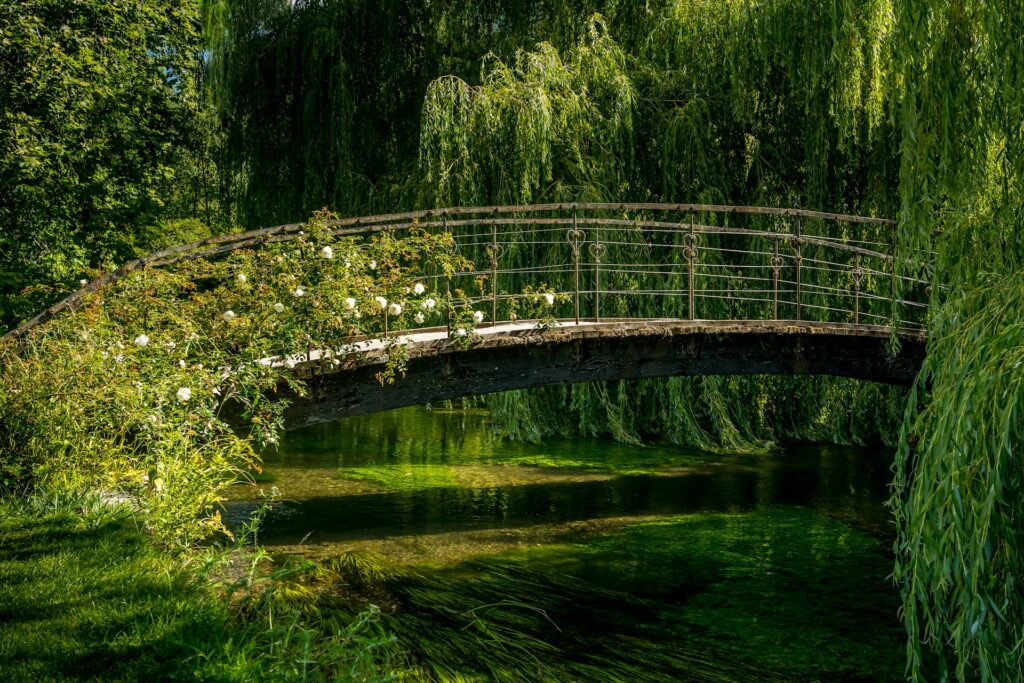Transforming a part of your garden into a true sanctuary of peace is a dream for many. A zen corner is not only about creating an aesthetically pleasing space but also about offering an atmosphere of serenity and relaxation. Crafting such an area requires careful planning and the integration of various natural and architectural elements.
One of the essential aspects of creating a zen corner is ensuring there is enough shade to provide a cool and comfortable retreat, even during the hottest days. A pergola can be an ideal solution. In addition to providing shade, it adds an architectural dimension to your garden. Choose a pergola made of natural materials like wood or bamboo to maintain the organic feel of the space. For instance, a wooden pergola covered with climbing plants such as wisteria or jasmine not only offers shade but also fills the air with a delightful fragrance, enhancing the overall zen experience.
Alternatively, a wind-resistant parasol, like those from Belveo, can be a practical and stylish addition to your zen garden. These parasols are designed to withstand strong winds, ensuring that your shade solution remains intact even on breezy days. They can be easily moved and adjusted, allowing you to create shade wherever it’s needed most.
Incorporating water elements is another way to enhance the tranquility of your zen corner. The sound of gently trickling water can be incredibly soothing and help mask any background noise, creating a more secluded and peaceful environment. A small pond, a fountain, or even a simple water bowl with floating candles or flowers can be beautiful additions. The key is to keep it simple and harmonious with the rest of your garden.
Plants play a crucial role in creating a zen garden. Opt for a variety of textures and shades of green to add depth and interest to your space. Bamboo, ferns, and moss are classic choices that bring a touch of the traditional Japanese garden aesthetic. Additionally, consider incorporating rocks and gravel, which can be arranged in patterns or left in their natural state to mimic a dry riverbed or a serene mountain landscape.
Seating is another vital element to consider. A comfortable place to sit and reflect is essential in a zen garden. Natural materials like wooden benches or stone seats can blend seamlessly into the garden. Position the seating to take advantage of the best views and to create a sense of seclusion. Cushions and throws in neutral tones can add comfort without disrupting the calm palette of the garden.
Lighting can transform your zen garden into a magical retreat at night. Subtle and soft lighting, such as lanterns or solar-powered path lights, can create a warm and inviting atmosphere. Avoid harsh, bright lights that can disrupt the tranquility. Instead, focus on creating pools of light that highlight key features of the garden, such as a beautiful tree, a water feature, or a particularly striking arrangement of rocks.
Creating a zen corner in your garden is about more than just the physical elements; it’s about crafting an experience. Consider adding elements that engage all the senses. Aromatic plants like lavender or rosemary can provide a pleasant fragrance, while wind chimes can add a gentle auditory element. Smooth stones and soft moss invite touch, creating a more immersive experience.
When designing your zen garden, it’s important to keep maintenance in mind. The goal is to create a space that is easy to care for, so you can spend more time enjoying it and less time working on it. Choose plants that are well-suited to your climate and soil conditions, and consider installing an automated watering system to keep them healthy with minimal effort.



